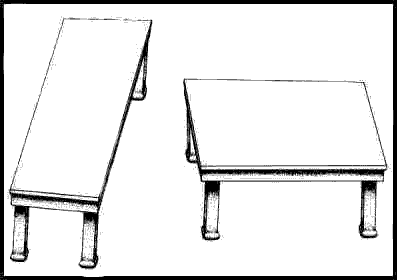Humans can't think clearly
We can discover our illusions through careful study, but we cannot stop ourselves from experiencing them, even when we understand that they are illusions.
Below is a well-known picture of two tables of apparently different lengths:

These two images are the same length. No, seriously. (Image Credit: Cool Optical Illusions)
Both tables are the same length - measure them for yourself. The interesting thing is, even after you measure and find them the same, when you take your measuring device away, you will not be able to accept it. It's impossible to overcome the sense that the table on the left is longer.
So we can take our illusions into account, but we cannot free ourselves from experiencing those illusions.
Cognitive illusions operate in an analogous manner. Not only are our cognitive illusions bigger and more serious than our optical illusions, but they are harder to demonstrate since we cannot simply hold a ruler up to the errors in which we process data and form conclusions.
Manipulating Choices
Using a comparison of European countries over rates of organ donation shows that the way questions are formed - especially questions over intellectually or morally complex issues - has a huge influence on which choices people make.
In the case of organ donations, European countries are divided into a few with extremely low rates of donors and countries with nearly 100 percent donors. The difference is not social or cultural and is not related to incentives. Instead, the difference is that in some countries, citizens need to check a box on a form to authorize organ donation, and in the other countries, citizens need to check a box on a form to opt out of organ donation.
The issue is so complex, that people opt to go with the default choice - whatever that default happens to be - rather than figure out what to think about it.
It gets more interesting. Given a choice between an all-expenses paid trip to Paris or Rome, respondents are roughly evenly split. However, by adding a third choice - a trip to Rome where all expenses are paid except for a morning cup of coffee - a majority of respondents choose the trip to Rome including coffee.
Adding a slightly inferior version of the Rome trip makes the full Rome trip look even better than the Paris trip by comparison.
One of my favorite quotes is by Stuart Chase, quoted in S.I. Hayakawa's classic Language in Thought and Action:
Common sense is that which tells us the world is flat.
As a society, it's high time we start to cultivate a lifelong habit of questioning our assumptions, revisiting received wisdom, subjecting our hypotheses to vigorous empirical testing, and openly debating public policy not based on conformance to this or that narrow ideology or dogma, but to demonstrable and repeatable evidence.


No comments:
Post a Comment